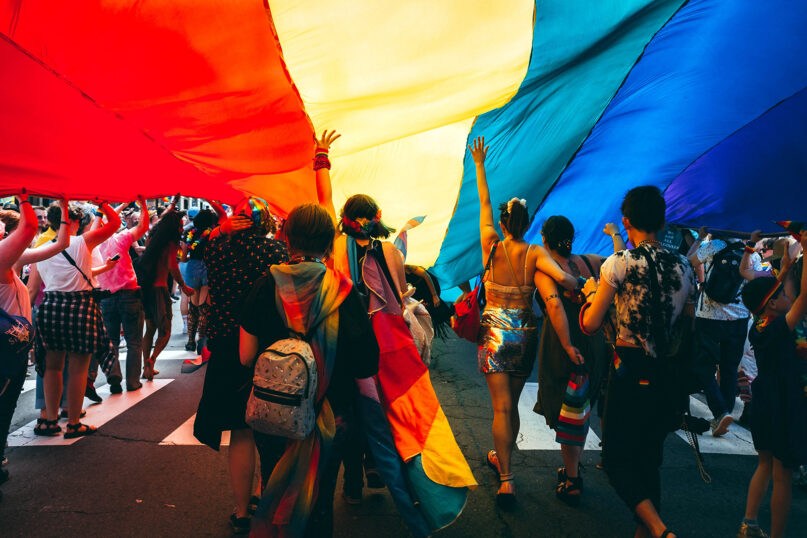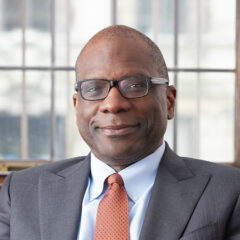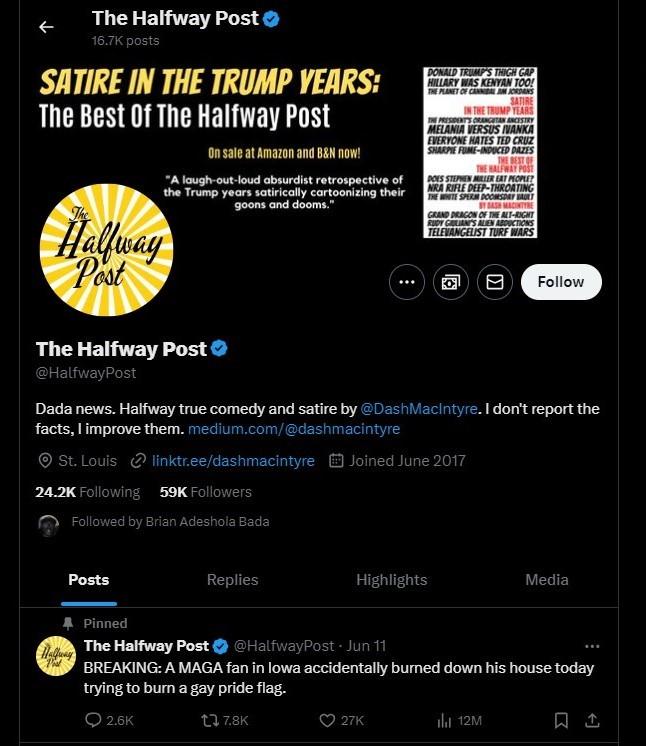The War in Gaza Is Dividing the LGBTQ+ Community
A sign in support of Palestine, seen at a Brooklyn Pride event in Park Slope on Saturday, June 8, 2024. (Laila Stevens/The New York Times)
FIRE ISLAND PINES, N.Y. — In the upscale gay resort town of Fire Island Pines, colorful flags honor LGBTQ+ history makers like actress Wanda Sykes and drag queen RuPaul in a small park near the harbor. For a few hours this month, one flag also honored Rep. Ritchie Torres, the first openly gay Afro Latino member of Congress.
But Torres is also an outspoken supporter of Israel, and not long after his flag went up, it was torn down by the gay activist group ACT-UP, which was also honored at the park, and replaced with two flags, one of which honored queer Palestinians.
Within hours, the flag for queer Palestinians was also torn down by Michael Lucas, a pornographic performer and filmmaker with a history of anti-Muslim statements.
Sign up for The Morning newsletter from the New York Times
The dispute on Fire Island, just off Long Island, was just one expression of the tensions over the war in the Gaza Strip that have wracked American public life. But within New York’s LGBTQ+ community, whose members hail from every ethnic and social background and tend to be highly attuned to issues of social justice, the war has touched off some especially raw conflicts.
Those divisions have been on full display during Pride Month, a time typically focused on celebration and solidarity.
The fight over how the community should respond to the war in Gaza has played out in fiery online comments and false accusations of pro-Hamas activity. On Fire Island, the flag conflict has pitted Torres and local homeowners, including Lucas, against the very activists honored at the park. Elsewhere in New York, similar, if lower-profile, disputes have shaken gay bars, LGBTQ+ fundraising dinners and Pride festivities.
“I think queer people are mostly on one side of the debate,” said Afeef Nessouli, a journalist and activist who has been highlighting the stories of LGBTQ+ people in Gaza on his popular social media channels since the war began. “It feels like queer people are coming out for Palestine in a really large way.”
Indeed, members of the LGBTQ+ community overwhelmingly self-identify as politically liberal or moderate, according to polls. A majority of Democrats have disapproved of Israel’s actions since at least last November, one month after the war began, according to Gallup surveys.
The war in Gaza began Oct. 7 after a Hamas-led attack on Israel killed roughly 1,200 people and resulted in 250 more taken to Gaza as hostages, according to Israeli officials. Since then, more than 36,000 people have been killed in Gaza, health officials in the territory said. Almost 2 million people have been displaced from their homes in Gaza, and the region’s civilian infrastructure has been destroyed.
Last month, the top prosecutor of the International Criminal Court said he was seeking arrest warrants for the leaders of both Israel and Hamas on charges of crimes against humanity.
But supporters of Israel, including some vocal LGBTQ+ people, often argue that the community should support the country because, while it lags behind Western countries on some gay rights issues, it is more tolerant than other places in the Middle East.
In Gaza, like in many places in the Arab world, homosexuality remains taboo, and gay life happens largely behind closed doors. Government persecution is not uncommon, and in one high-profile case, Hamas killed a prominent commander after accusing him of embezzlement and homosexuality.
“Did it ever occur to them that Hamas is a barbaric oppressor of Queer Palestinians?” Torres, who represents the Bronx, said in a statement after the Fire Island controversy, in reference to the activists who removed his flag. “A Queer Palestinian is far freer and safer in Israel than in a Gaza Strip ruled by Hamas.”
Pro-Israel social media accounts, including one run by the Israeli foreign ministry, have made similar arguments. One post that was shared by the Israeli government in November shows a smiling Israeli soldier in Gaza holding a rainbow flag against a backdrop of bombed-out buildings. An Israeli tank can be seen behind him.
“The first ever pride flag raised in Gaza,” the foreign ministry said on the social platform X.
Critics of Israel describe these arguments as pink-washing, or the use of a country’s positive approach to LGBTQ+ issues to distract from its poor human rights record in other areas.
“Just because we can’t have a gay pride parade in your town does not mean you deserve to be starved or bombed,” said Mordechai Levovitz, the founder of Jewish Queer Youth, an organization for Orthodox and ultra-Orthodox LGBTQ+ young people in New York, and a critic of Israel’s conduct in the war.
“So much of my family still very much rejects queer people, but I would never want them to be hurt or starved or oppressed just because they don’t accept me,” said Levovitz, who grew up in a conservative religious home. “Rejecting that kind of binary” is an important part of being a member of the LGBTQ+ community, even if it is complicated, he said.
Disputes over the war have erupted elsewhere since Oct. 7.
Large crowds protested a Human Rights Campaign gala in New York in February and the GLAAD Media Awards in Los Angeles in May. They denounced the ties of both groups to pro-Israel organizations or to defense contractors that make weapons for the Israeli military. One of HRC’s donors is Northrop Grumman, a defense company; GLAAD partners with the Anti-Defamation League, a group that combats antisemitism and other bigotry and supports Israel.
In Brooklyn, the nightclub Three Dollar Bill has spent months grappling with the fallout of its decision to host, then cancel, then uncancel a party for Eurovision, the international song contest that faced criticism this year for letting Israel participate. Activists on both sides decried each move the club made, and in recent weeks, it has been hit with a wave of what its owners believe are politically motivated Pride month cancellations.
The divisions have also ensnared The Center, the prominent LGBTQ+ community hub in Greenwich Village, a neighborhood that has played a central role in gay history.
In March, The Center hosted an iftar event for Ramadan, where gay and transgender Muslims, their friends and community leaders gathered to celebrate the daily breaking of the fast.
But The Center’s own fraught history with queer Middle Easterners and Muslims loomed large. It was in the middle of conflict in 2011 after Lucas, the Fire Island filmmaker, successfully pressured it to cancel a pro-Palestinian event.
During remarks at the Ramadan event, Bashar Makhay, a co-organizer of Tarab NYC, an LGBTQ+ Middle Eastern organization, noted that The Center had apologized for the past.
But he also urged it to go further and announce support for Palestinians, “denounce pink-washing, demand a cease-fire and condemn the ongoing genocide.”
The audience cheered. When the applause died down, Makhay continued. “Liberation — including queer and trans liberation,” he said, “is not achieved through silos or silence.”
Fire Island has been a slow-moving summertime refuge for LGBTQ+ people since the 1950s and has welcome prominent vacationers like Calvin Klein, David Geffen, Jonathan Van Ness and Bowen Yang.
The conflict there arose this month after a ceremony at Trailblazers Park, a tiny pavilion on the boardwalk where flags fly honoring notable members of the LGBTQ+ community.
During the ceremony, Iman Le Caire, an Egyptian transgender activist who helped to establish the park, called for an end to the war. She told the crowd that when she said, “Free Palestine,” she meant “free our queer and transgender people” in Gaza and the West Bank.
“We stand for them,” she said. “When we say, ‘Free Palestine,’ we are not saying, ‘Free Hamas.’”
Nevertheless, a homeowner later accused Le Caire on Instagram of using her speech to support Hamas and to engage in antisemitic hate speech, setting off days of acrimonious back-and-forth.
Tensions rose further when members of ACT-UP, an activist group best known for raising the alarm about the AIDS crisis in the 1980s and 1990s, tore down the flag honoring Torres. The group replaced it with the flag honoring queer Palestinians and another to honor Cecilia Gentili, a transgender leader who died in February.
Jason Rosenberg, a member of ACT-UP New York, said group members planned their protest after they learned they would be honored alongside Torres.
“We thought Ritchie was a poor choice to be honored, especially this year, because he has been supporting Israel’s policies,” Rosenberg said.
Lucas, who quickly tore down the pro-Palestinian flag, is well known in the community for his years as an opinion writer on gay news sites. He has frequently criticized Islam and Muslims and once expressed his support for burning the Quran, which he compared to Mein Kampf. He was widely criticized last year after he tweeted a picture of an Israeli rocket with the words “From Michael Lucas, to Gaza” written on it.
Lucas posted a video on social media of himself carrying a stepladder to the park; tearing down the flag, which included ACT-UP’s traditional slogan, “Silence = Death”; and throwing it in the trash. He did not respond to a request for comment.
“We don’t need Hamas propaganda dividing us,” he wrote in the post with the video. “Otherwise this ‘open and diverse’ community will be unwelcome to Jews.”
Torres echoed Lucas on June 2, writing on X that by supporting the Palestinians, members of ACT-UP “openly align themselves with Hamas.”
Eventually, the Fire Island Pines Property Owner’s Association, which acts as a sort of de facto town government for the summer colony, took down all three flags from Trailblazers Park and said it would find a new way to honor Torres.
Its president, Henry Robin, also wrote a letter to the community praising Le Caire, Torres and ACT-UP. He reminded everyone that, whatever their differences, they were all part of the same community.
“It was not the first time, and will not be the last, that different segments of the LGBTQ+ community have been at odds with one another,” he wrote. “Advocacy, protest, and even conflict are all part of LGBTQ+ history, but even amid our disagreements we can continue to build a brighter future together.”
c.2024 The New York Times Company














